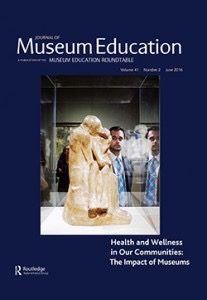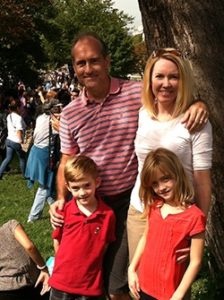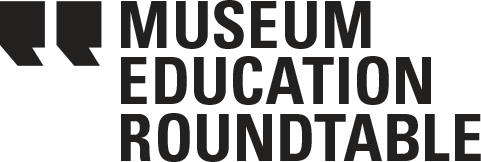To Start Life Anew Again
My husband was diagnosed with cancer a few short months ago. Cancer. Even today, the word carries with it that horrible feeling of dread, the acknowledgement that, as humans, we are not invincible, the acceptance that our time here on this planet is precious, and the recognition that we all want to find meaning in our lives, however we each define it. Life and living it well rise to the top of the to-do list, instead of doing the laundry or asking the kids one last time to get their pajamas on.

I received my copy of the latest Journal of Museum Education (JME), Health and Wellness in Our Communities: The Impact of Museums, the day before my husband’s surgery. This issue has particular meaning to me because I guest edited the publication with my dear colleagues, Brooke DiGiovanni Evans and Carole Krucoff. The JME’s arrival, while in the midst of my own family’s battle with disease, was timely. As I waited for my husband to come out of his four-hour surgery, I read the issue front to back, with fresh yet weary eyes.
The questions Museum Education Roundtable (MER) posed for the JME Reader Guide to accompany the issue kept swirling in my head as I read the articles. Now, many of these questions had particular relevance to me personally.
How do you prioritize health and wellness in your life or your family members’ lives? In what ways have you or someone you care about been impacted by a disease or disability? What role do you think museums should or could play in contributing to the health and wellness of people in your community?
For many of us fortunate enough to have been raised going to museums from the time we were young, a museum is a place of solace and comfort, adventure and wonder, a beacon for learning. But is it a place for healing?
In Health and Wellness in Our Communities: The Impact of Museums, museums conducted qualitative and quantitative evaluations of their wellness programs. The Children’s Museum of Manhattan found their in-depth EatPlayGrow health programs showed positive changes in the attitude and behavior of children and parents in relation to “food, physical activity and sleep.”(1) Art in the Moment, a program conducted by the Art Institute of Chicago for people diagnosed with dementia and their care partners, noted less isolation, a heightened sense of mood and greater participation in social activities as a result of enrollment in their program.(2) Boston Museum of Fine Arts served medical practitioners prone to burnout and loss of empathy with a museum experience “so effective at fostering connection between learners and enhancing their reflective capabilities,” that the program is now a “foundational” activity utilized by the participating medical school. (3)
Each one of the articles discussed in this issue focused on health programs for specific audiences but did not address the healing that museums themselves lend to general visitors. There is a multitude of research that supports the notion that museums are places of healing. In Daniel Fujiwara’s, Museums and Happiness: The Value of Participating in Museums and the Arts, it was found that “visiting museums has a positive impact on happiness and self-reported health.”(4) The HUNT study from Norway, involving 130,000 participants, discovered a similar outcome–“the more cultured participants were, the better their self-reported health.” It was also found that culture and the arts have a greater impact on men than women, actually lowering their risk of anxiety and depression.(5) And finally, as Helen Chatterjee feels is demonstrated in her book, Museums, Health and Well-Being, museums can truly “build social capital and resilience, and improve health and well-being.”(6)

What does all of this mean as I have watched my husband convalesce over the past month? While we received the glorious news that the surgery has most likely rendered him cancer-free, it does not immediately translate into happiness and well-being. During the last month, I have seen him go through an emotional see-saw of highs and lows, which was unexpected given the gift of this news. What could I do to help him navigate this uncharted territory? My first thought was to take him to a museum. Even if I had not read the research, even if I had not guest-edited this JME, I instinctively knew that visiting a museum would provide inspiration and engagement. It would give him an avenue to get back on track and enter his life again. And so, as his month of confinement officially ends this week, we will go to museums and we will get connected and we will begin the emotional healing process to start life anew again.
If you are interested in reading JME 41.2 Health and Wellness in Our Communities: The Impact of Museums, join MER today for digital access to this, and all other JME content.
Heather Johnson is a museum consultant in the museum and education fields for the past 20 years, promoting the vast benefits of hands-on learning experiences for young children and across the life span.
Opening photo credit: untitled by jalexartis, via Flickr.
Notes
- (1) Evans et al., “Health and Wellness in Our Communities: The Impact of Museums,” 86.
- (2) Evans et al., “Health and Wellness in Our Communities: The Impact of Museums,” 106.
- (3) Evans et al., “Health and Wellness in Our Communities: The Impact of Museums,” 127.
- (4) Fujiwara, “Museums and Happiness: The Value of Participating in Museums and the Arts,” 8.
- (5) Park, “For Men, Good Health May Be Found at the Museum.”
- (6) Chatterjee, “New Findings Show Museums Can Make You Healthy and Happy.”
References
Chatterjee, Helen J. “New Findings Show Museums Can Make You Healthy and Happy.” Museums and Collections Blog, UCL. October 17, 2013. Accessed June 28, 2016 https://blogs.ucl.ac.uk/museums/2013/10/17/museums-can-make-you-healthy-and-happy/.
Evans, B., H. Johnson and C. Krucoff. “Health and Wellness in Our Communities: The Impact of Museums.” Journal of Museum Education 41.2 (2016): 77-127.
Fujiwara, Daniel. “Museums and Happiness: The Value of Participating in Museums and the Arts.” The Happy Museum Project. April 2013.
Park, Alice. “For Men, Good Health May Be Found at the Museum.” Time, May 24, 2011. Accessed June 28, 2016 http://healthland.time.com/2011/05/24/for-men-good-health-may-be-found-at-the-museum/.

